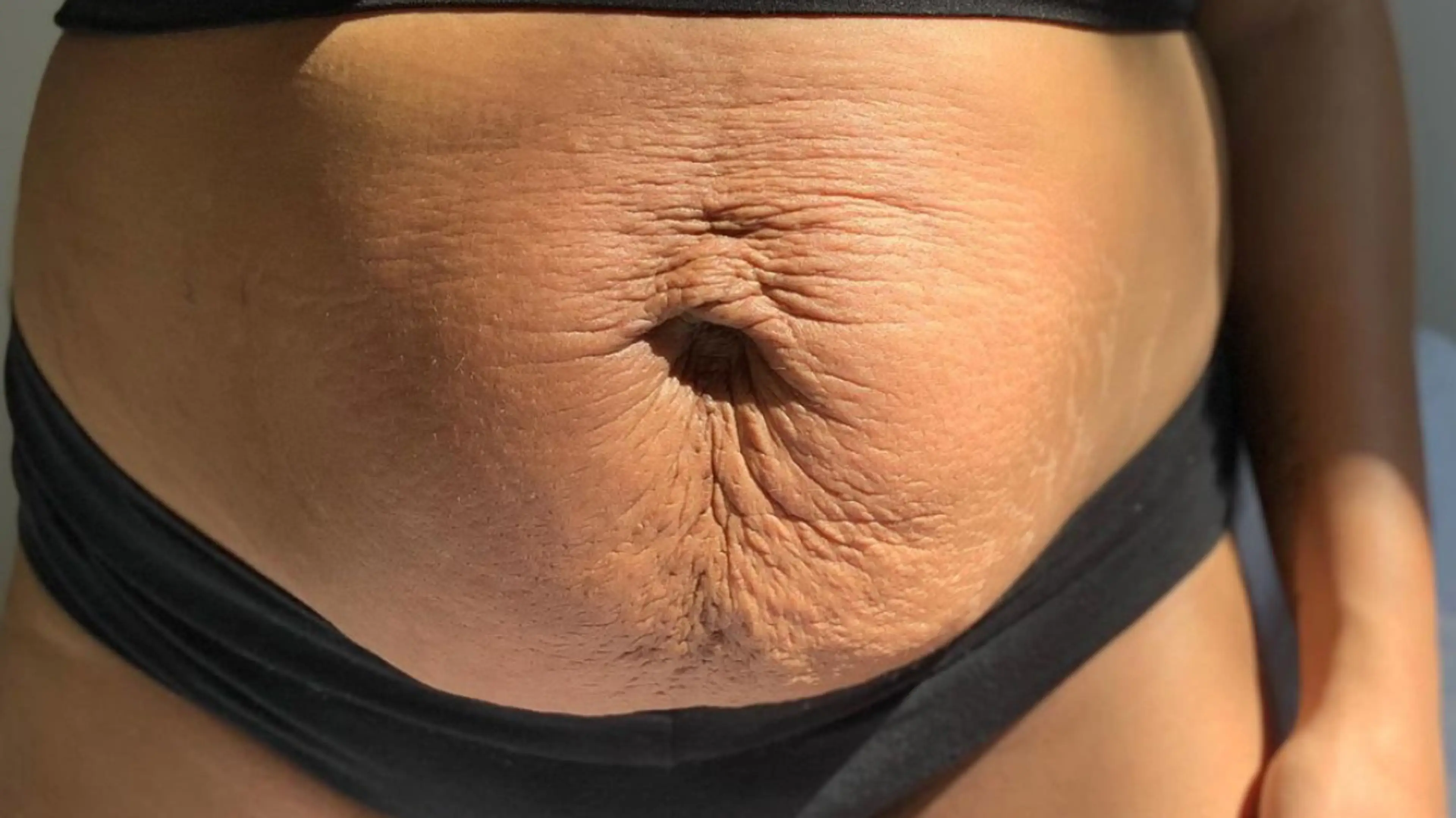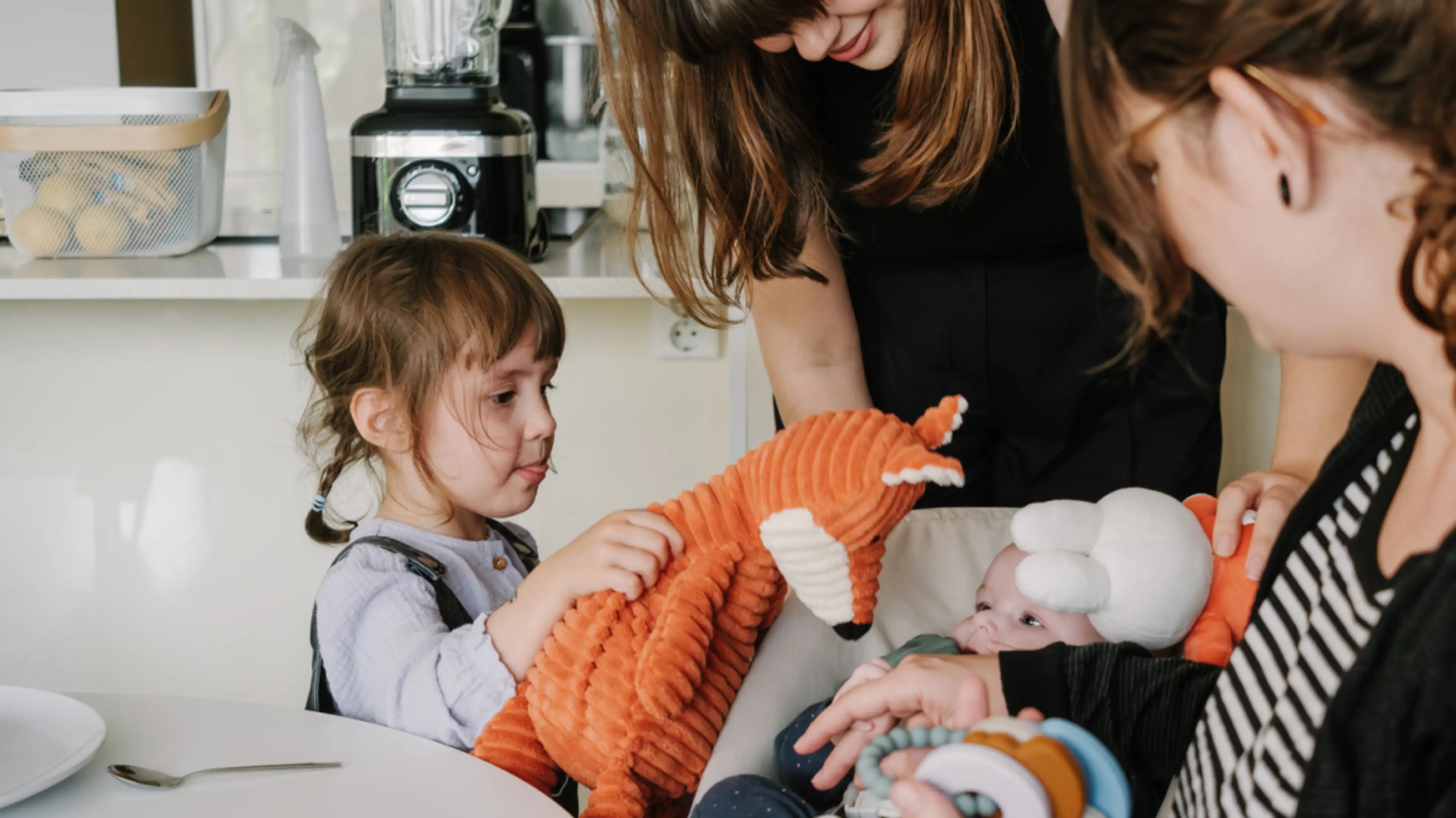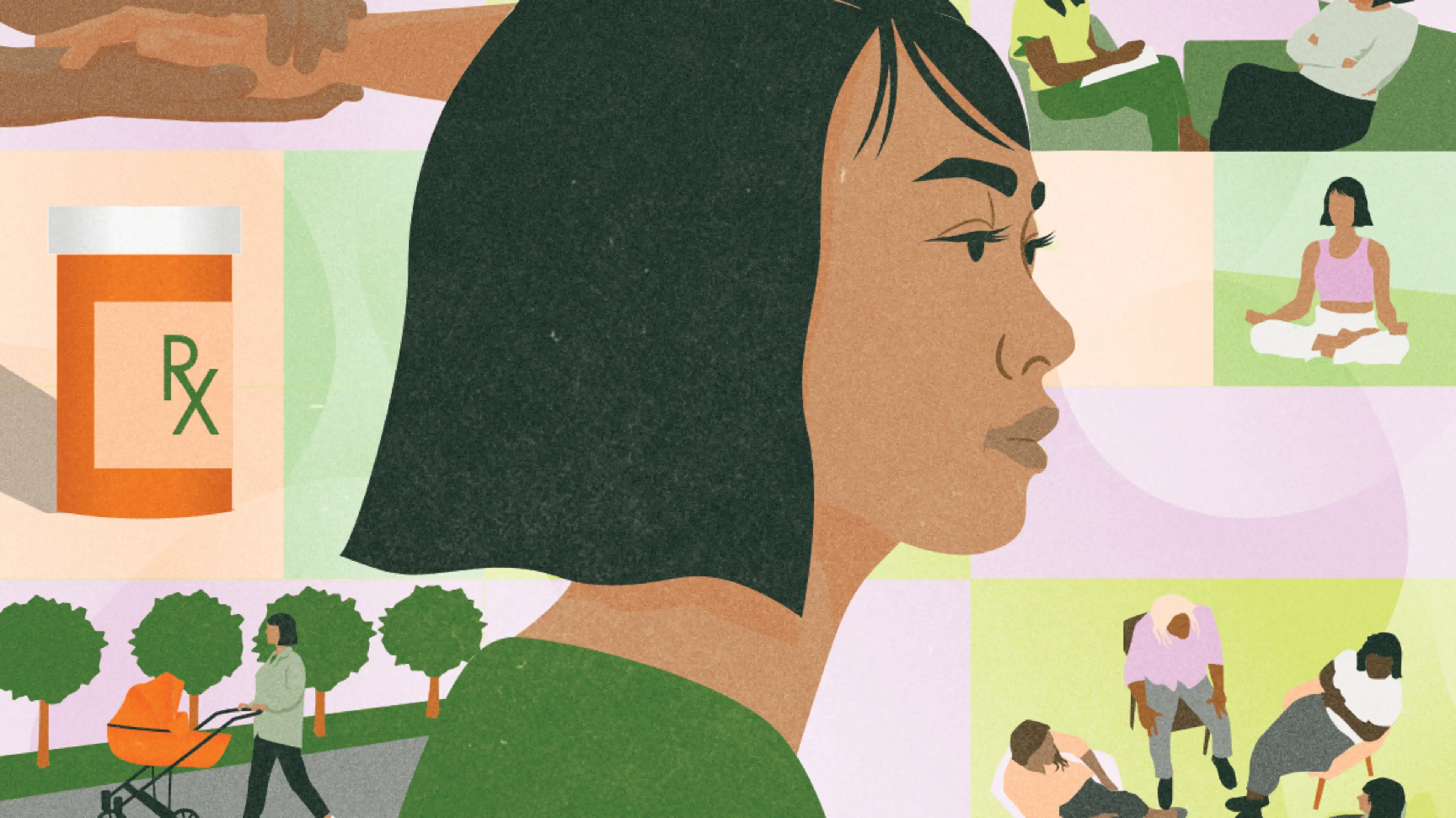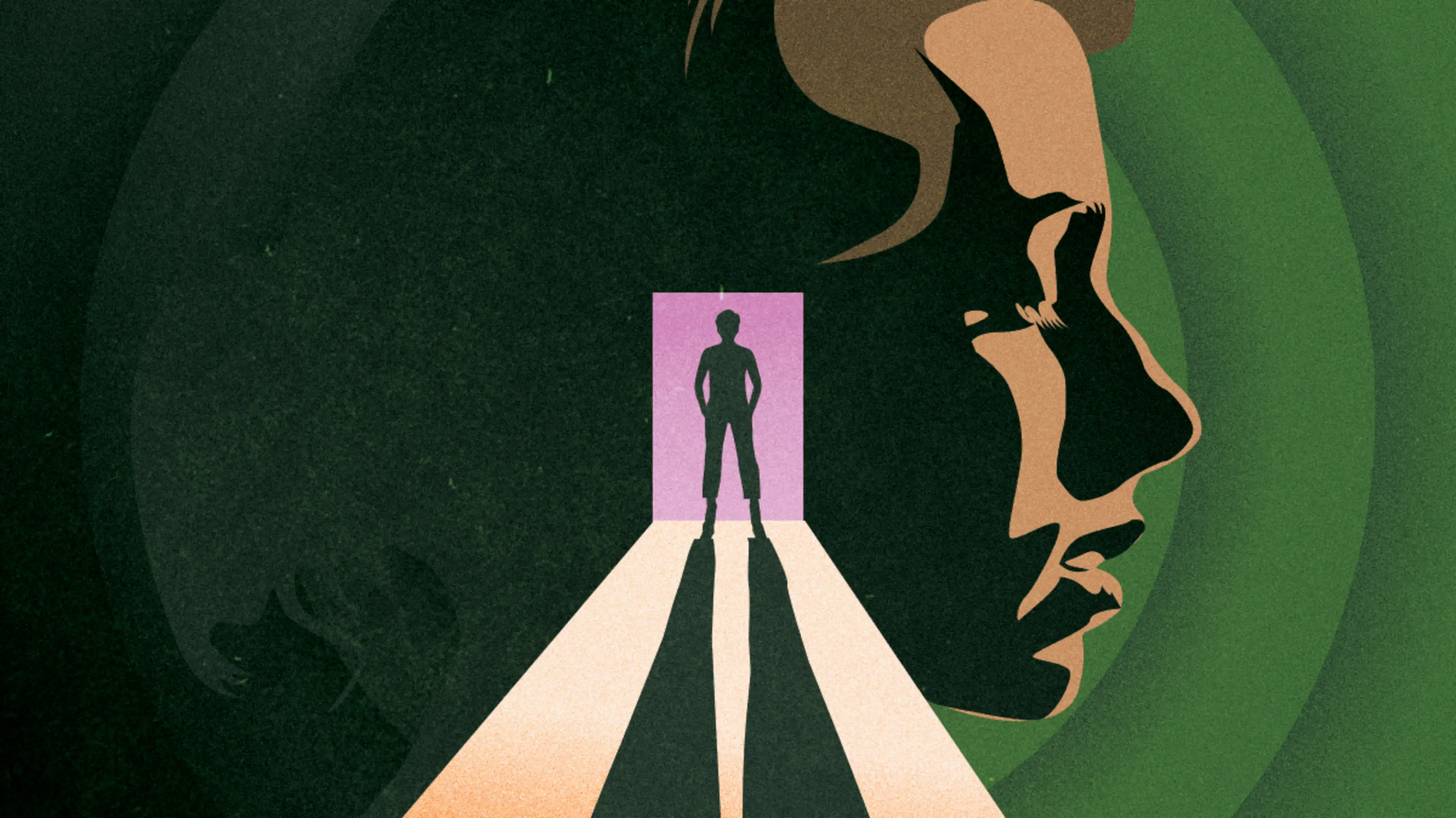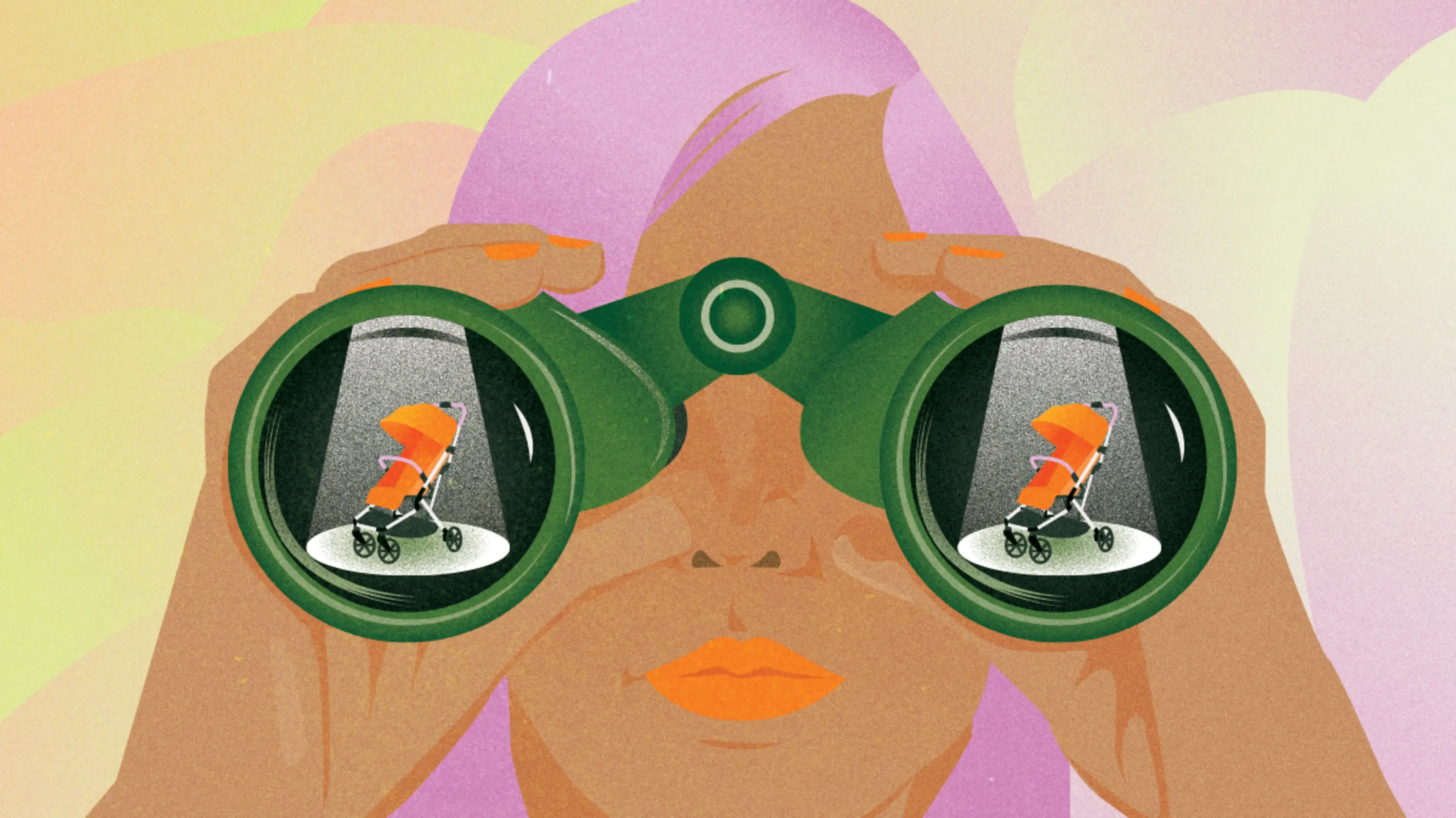In the first few weeks (months?!) after having my son, I remember going about daily tasks in a haze—feeding him, holding him, pumping, washing pump parts and bottles, going to lactation appointments and doctor visits—like I had just stepped into someone else’s life. I was taking care of this tiny human that my heart had burst wide open for, but everything was different. It was like I was living as my dream self, walking around in my mind’s version of our house—it felt like home, but I didn’t quite recognize it. My reality was in flux, and it was disorienting, to say the least. Perhaps the most visceral feeling I remember from that time is sitting on the couch with my baby nestled into me, and suddenly the lights would flip on in my brain, like “OMG, I’m a mom, I have a baby!”
It took me a while to feel like I had an idea of what the hell was going on (let alone feel close to my pre-baby self again), and I started to wonder if I was the only new mom who felt that way. Now, 3.5 years in, here’s my take: I don’t think anything can ever truly prepare you for this complete life change. Actually, stepping into motherhood for the first time is a shock to the system—and that’s okay.
If you are in the thick of babyhood, you might be wondering (or screaming into the void), how long will it take to feel like myself again? Unfortunately, the answer is that it depends. For me, it took until my son was approaching his first birthday to really feel more like myself (which not so coincidentally marked when he started to sleep through the night), and each month after that felt like I got a little piece of the “me” puzzle back—albeit the picture looked a bit different than it did before.
With that in mind, I talked with experts and moms to understand the typical timeline for healing your body and adjusting mentally to your new normal. Here’s what I learned.
It Takes Time for Your Body to Heal
No matter your pregnancy and birth journey, your body just went through something momentous. You grew a tiny collection of cells into a fetus that could live outside of you—and then did whatever you had to do to get that baby into the world. That’s huge! So it’s no wonder our bodies don’t bounce back in a day.
Practically speaking, healing from a vaginal delivery takes about six weeks, depending on the severity of any tears, and about six to eight weeks for a C-section, which involves more sutures, more incision lines, along with no heavy lifting (like a toddler) during that time, says Dr. Danielle Panelli, an ob-gyn and a clinical instructor in the Maternal Fetal Medicine Department at Stanford Medicine.
For people with vaginal tears, “by six weeks, the tear should be mostly healed, but it still isn’t going to be back to normal,” says Dr. Panelli. Why? You’ll likely have some lingering scar tissue past that six-week mark that may take a few more months to resolve. That’s why she strongly recommends partnering with a pelvic floor physical therapist, who can work with you on different exercises and even massage the scar tissue to help break it up. This aids in healing and allows you to do things like have sex pain-free again.
Oh, and don’t forget that on top of all of that healing, you’re also taking care of a new baby, which is unique to recovering from childbirth. “Your recovery from an appendectomy is very different from your recovery from a delivery because now you have a baby. Your own recovery is influenced by these other factors,” she says. “How much of the recovery is related to the experience of birth itself and how much is related to what happens when you become a parent?”
While the six- to eight-week mark is a good baseline for checking in with your physical healing, most moms still feel far from normal. “Just anecdotally, it’s definitely a longer road to recovery,” says Dr. Panelli. “We’ve been doing work with biomarkers that show [they] still are probably not normal even up to six months postpartum, because you’re still in this recovery phase.”
Dr. Panelli’s best advice? Give yourself grace, acknowledge that you’ve been through a lot physically and emotionally, and know that you’re doing the best you can.
Read Next: 7 Ways to Help You Feel More Like Yourself After Having a Baby
Adjusting Mentally to Motherhood Can Be Tough
Everyone reacts differently to the enormous transition to becoming a parent, but there is no doubt that it can feel overwhelming, at least at first. “During those first few months, women don’t really have a lot of space for taking care of themselves,” says Dr. Nicole Derish, a women’s mental health psychiatrist and therapist. “A lot of babies benefit from constant skin-to-skin contact, and they have difficulty sleeping and regulating if they’re not touching mom, so it can be very hard for moms to rest, feed themselves, and get adequate time to speak to other women,” she says.
In the meantime, their partner usually has to go back to work after a couple weeks, leaving them alone with a newborn for eight uninterrupted hours. “That can be very isolating, and isolation is another really difficult aspect of early motherhood,” says Dr. Derish.
Karissa Whitman, 32, went through a rocky transition when her first son was born. Though her pregnancy had been smooth, there was a complication during delivery that required her newborn to go to the NICU for a few days. Whitman had also developed an infection, forcing the two to be separated during that time. “Between that and a lot of breastfeeding challenges, things compiled together to make me feel like maybe I’m not really fit for this motherhood stuff,” she says. Adding to that stress, her husband, a firefighter, went back to working weekly 24-hour-plus shifts, which only fueled those early feelings of sadness and loneliness.
Societally, there is an expectation that primarily one person is going to meet every need of the baby, and continue to be able to do that for months and years, says Dr. Sarah Nagle-Yang, an Associate Professor of Psychiatry and Medical Director of Women’s Behavioral Health at the University of Colorado. “What we know is that all of us have our own needs and we are full people, and it’s very hard to only be giving and not having any sense of nurturance yourself,” she says. “To me, it makes total sense that people would struggle with this transition, because it’s just not a realistic expectation, and as a society we don’t do a lot to support new parents.”
As you start to come out of the fog that is the fourth trimester, it can also feel a bit like two steps forward, one step back. As soon as you settle into a groove, a sleep regression knocks you off course, or teething kicks in and your baby turns into a scream demon overnight. “Babies are changing so much, so it’s hard to feel like you’re in a place that’s stable and predictable,” says Dr. Nagle-Yang.
That said, it’s important to get into the practice of asking for help when you need it. Routines and rhythms often start to settle in around one year postpartum, Dr. Nagle-Yang says, which is when many new moms say they feel close(er) to themselves again. This was certainly true for Whitman, who says it was close to the one-year-mark that her sense of self returned. “I had started getting into a rhythm of prepping our meals together and working out again,” she says, “and then I found out I was pregnant with my second child.”
You Might Be Sensitive to Fluctuations in Hormone Levels
After you deliver your baby, estrogen and progesterone plummet. This is totally normal and, no, your hormones aren’t out of whack. But, some women’s brains are exquisitely sensitive to this rapid shift in hormones, says Dr. Derish, and that can put you at a higher risk for developing postpartum anxiety or depression.
If you are someone who experiences worsening anxiety and depression before your period, or who has a history of PMDD, giving birth is a similar kind of shift, but at a much higher magnitude1 . So it’s important to check in with how you’re feeling in the first few weeks after delivery. (Warning signs can include feeling emotionally blunted or joyless, trouble connecting with your baby, extreme anxiety around the safety of your baby, and inability to sleep when the baby is sleeping.)
Let’s say you’re cruising through the newborn phase and breastfeeding is going well. Keep in mind that there is another drop in hormones that comes when you wean from breastfeeding. Again, if you are sensitive to hormonal fluctuations, this can be a second trigger for perinatal mood disorders, says Dr. Nagle-Yang.
Left untreated, perinatal mood disorders can continue on for years. Read: postpartum depression and anxiety are not restricted to the immediate postpartum period, and that can have a lasting effect on you and baby. “This can affect your ability to parent and feel like yourself,” says Dr. Derish. “There is no healthy child without a healthy mom.”
So, feeling like yourself again may come down to getting treatment like Jenn Levin did about six months after having her second daughter. “I felt like I was drowning, like I was losing my mind, like motherhood was just torture,” she recalls. At first, she was resistant to an antidepressant. As a hypnotherapist, she wanted to work through the root of the problem. “After getting over the initial hump of putting something into my body that wasn’t ‘natural,’ I opened my mind to give it a try,” she says, “and it was completely life-changing.”
Give Yourself Time to Acclimate to This Huge Transition
If you feel completely out of your comfort zone after having a baby, know that just about every new mom has felt this way at some point. Whether you don’t recognize yourself in the mirror, you’re struggling to keep up with the rigors of your baby’s schedule, or you’re just so damn tired, things will settle in eventually. There are even certain milestones you can look forward to and strategies you can try that will give you little pieces of yourself back. For now, give yourself some grace, have a snack, go out on a walk, and, most importantly, don’t be afraid to ask for help.
Read Next: 7 Ways to Help You Feel More Like Yourself After Having a Baby


